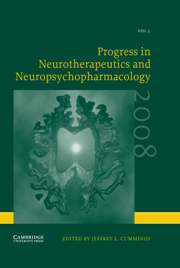No CrossRef data available.
Article contents
Olanzapine as Maintenance Therapy in Patients with Bipolar I Disorder
Published online by Cambridge University Press: 28 November 2006
Extract
ABSTRACT
Effective treatments for the prevention of relapse and recurrence of mood episodes in patients with bipolar disorder are essential to reduce the high mortality associated with this condition, and to improve long-term outcomes. While lithium is considered to be effective as a first line maintenance treatment, additional treatment options would provide clinicians with tools to address the needs of individual patients. The efficacy of olanzapine, an atypical antipsychotic, for the prevention of relapse in bipolar disorder has been demonstrated in several randomized controlled double-blind clinical trials, both as monotherapy and in combination with other agents. The data reviewed herein suggest a more robust efficacy of treatment with olanzapine in the prevention of relapse into manic episodes than into depressive episodes. The adverse events observed most frequently in patients treated with olanzapine relative to comparators were related to somnolence (somnolence, fatigue, or hypersomnia) and weight gain (weight gain, or increased appetite). Moreover, a larger proportion of olanzapine-treated patients than comparator-treated patients experienced clinically important weight gain.
- Type
- Review Article
- Information
- Progress in Neurotherapeutics and Neuropsychopharmacology , Volume 2 , Issue 1 , March 2007 , pp. 225 - 238
- Copyright
- © 2007 Cambridge University Press


